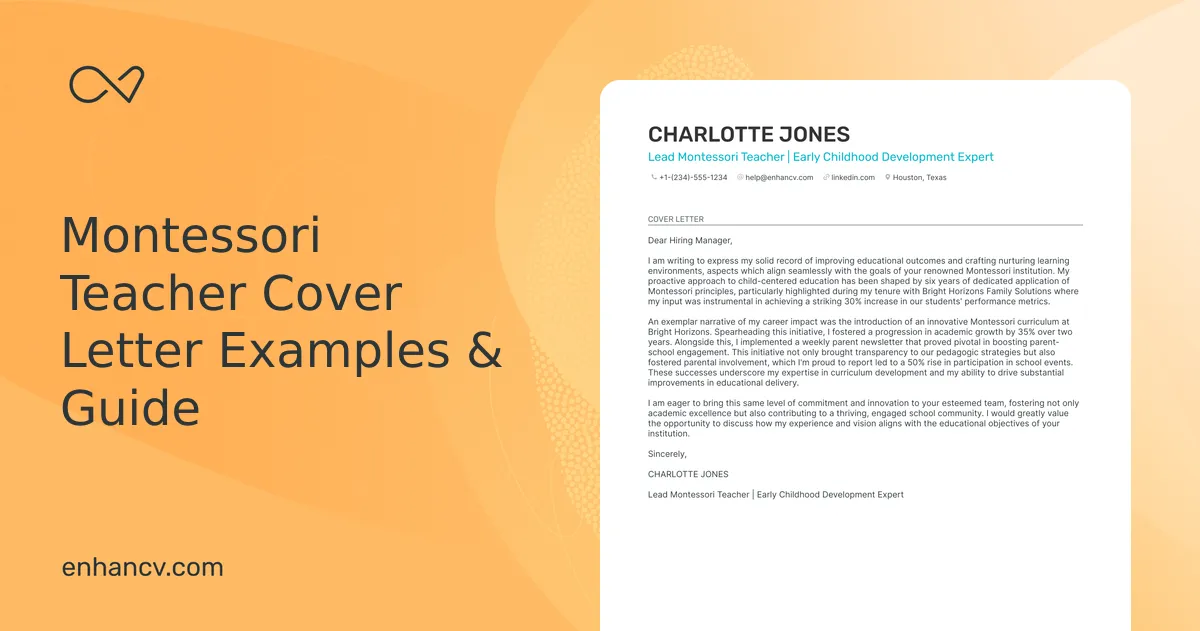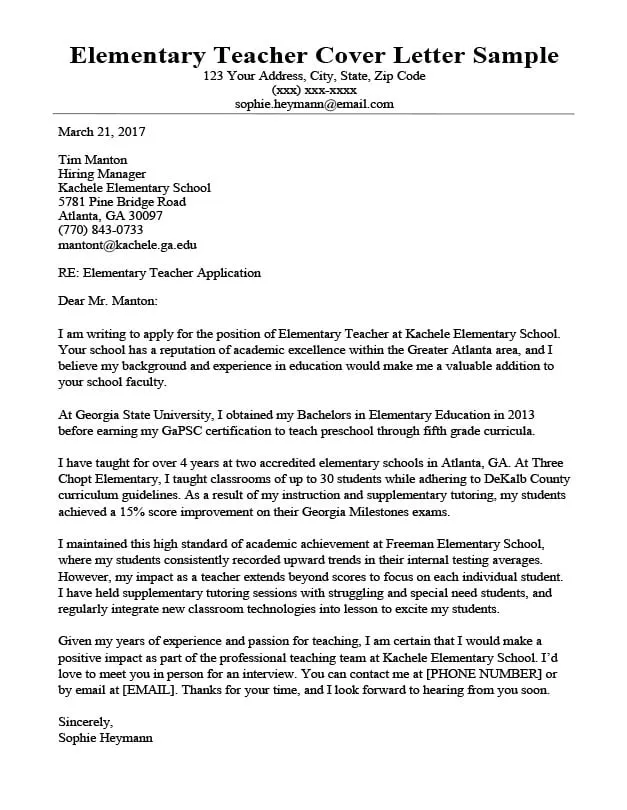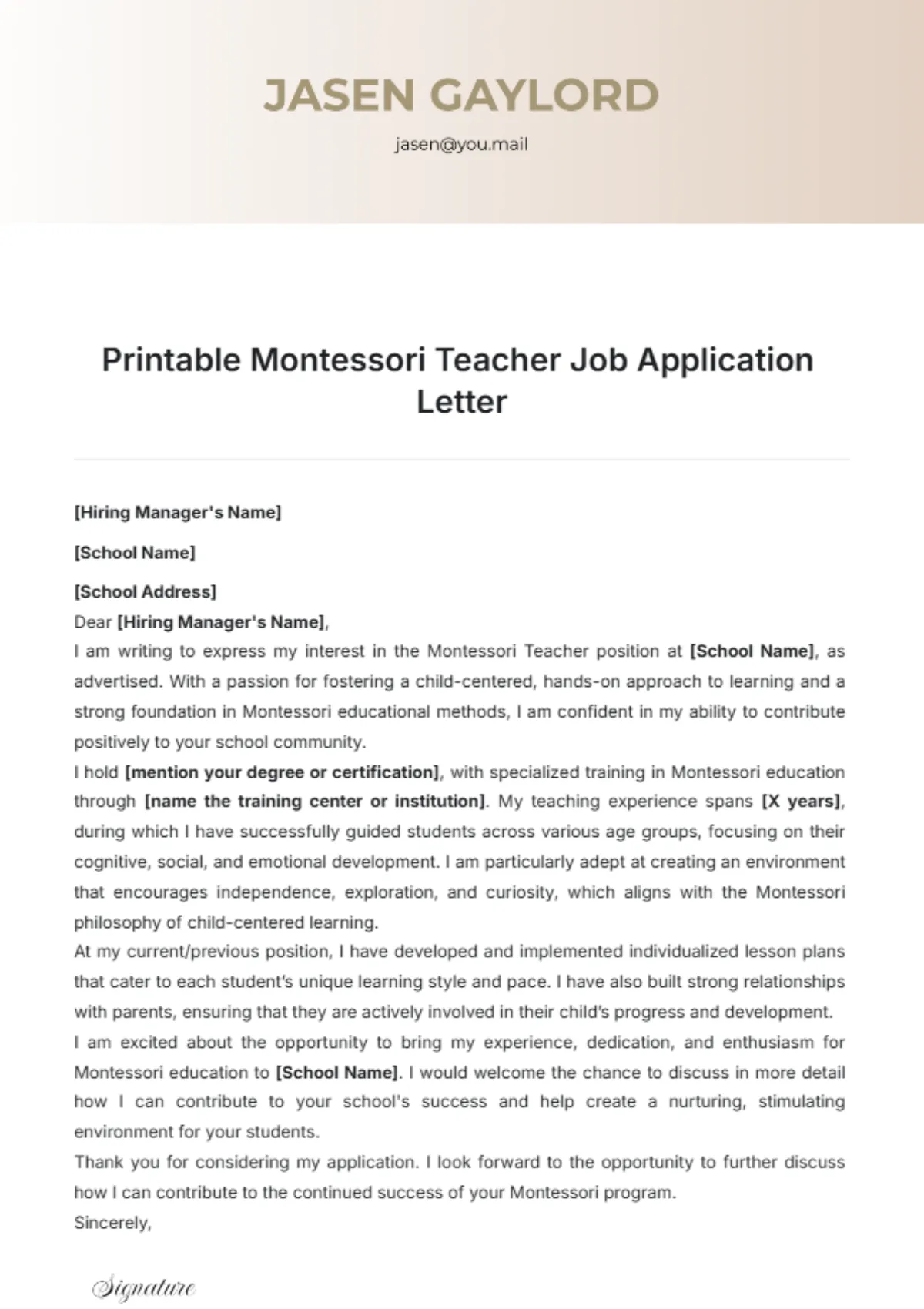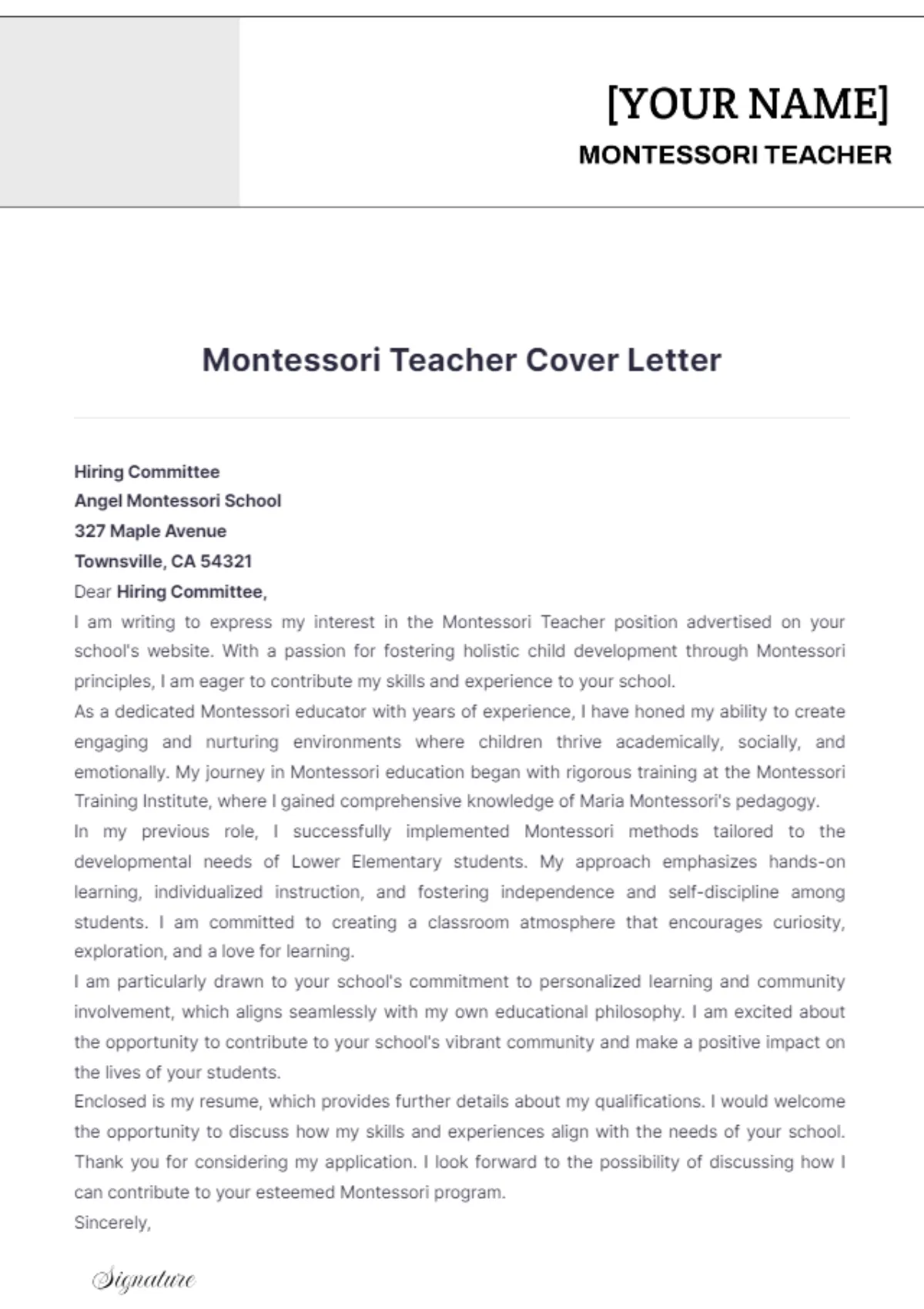Understanding the Montessori Philosophy
Before you even begin writing, a deep understanding of the Montessori philosophy is crucial. Your cover letter should reflect this understanding. This means more than just knowing the basics; it requires grasping the core principles that underpin this unique educational approach. The Montessori method, developed by Dr. Maria Montessori, centers on the child as a natural learner, emphasizing independence, hands-on learning, and a prepared environment. Key elements include mixed-age classrooms, child-directed activity, and the use of specialized materials. A well-written cover letter for a Montessori teaching position will demonstrate your familiarity with these concepts, showcasing your ability to create and maintain a nurturing and stimulating learning environment. It shows that you know the core principles and can communicate this.
Why a Montessori Cover Letter Matters
A cover letter is far more than just a formality; it is your first introduction to the hiring committee. It gives you the opportunity to showcase your unique qualifications and passion for Montessori education, setting you apart from other applicants. It provides the space to explain why you’re the perfect fit for the school. Unlike your resume, which presents a chronological overview of your experience, your cover letter allows you to tell a story, connecting your experiences to the specific needs and values of the school. Think of it as your chance to make a personal connection. It is a chance to show your personality and demonstrate your communication skills. A well-crafted cover letter shows you have invested time in the application and genuinely want the job. It’s your opportunity to explain your interest in the school.
Highlighting Your Montessori Experience

Your cover letter should highlight your experience in a Montessori environment. Describe the specific roles you’ve held, the age groups you’ve worked with, and the responsibilities you’ve had. For instance, instead of simply stating that you were a teacher, provide details. Mention how you guided children through practical life activities, introduced them to sensorial materials, or facilitated lessons in mathematics and language. If you’ve worked in a specific Montessori setting, such as a toddler community or an elementary classroom, specify that. Also, quantify your achievements whenever possible. Did you increase student engagement? Did you contribute to improved test scores? Did you introduce new activities? These kinds of details give the hiring committee a clear picture of your capabilities and your ability to bring value to their school. The goal is to prove that you can do the job and that you have a successful record.
Focus on Specific Skills
While a general teaching background is beneficial, focus on the skills directly applicable to the Montessori method. These include observation skills, the ability to create a prepared environment, and the capacity to adapt lessons to individual student needs. Mention your proficiency in presenting Montessori materials, guiding children through independent work cycles, and assessing their progress. Think about the day-to-day aspects of the job. Do you know how to manage a mixed-age classroom effectively? Can you create lesson plans aligned with the Montessori curriculum? Do you have experience in parent communication? By highlighting these specific skills, you demonstrate your readiness to step into a Montessori classroom and make an immediate impact. Your ability to nurture each child’s potential is key.
Demonstrating Your Knowledge of Montessori Principles
A successful cover letter showcases your understanding of core Montessori principles. These principles include the prepared environment, the role of the directress/director, the absorbent mind, and the sensitive periods. Demonstrate your understanding by referencing these principles in your letter. Discuss how you create a classroom environment that fosters independence and self-directed learning. Explain how you observe and assess each child’s individual needs and how you adjust your teaching accordingly. You can also elaborate on how you use Montessori materials to engage children in hands-on learning experiences. Mention your experience in fostering children’s concentration, coordination, and independence, key aspects of the Montessori approach. Showing your knowledge of these principles will impress the hiring committee and will set you apart. Your familiarity with the principles shows you’re not just a teacher, but a Montessorian.
Tailoring Your Letter to the School

Generic cover letters rarely make a strong impression. Research the school you’re applying to and tailor your letter to its specific needs and values. Visit the school’s website to learn about its mission, its approach to Montessori education, and its community. Does the school emphasize outdoor learning? Do they have a particular focus on arts or science? Reflect on how your experience and skills align with the school’s unique characteristics. In your letter, mention specific programs, initiatives, or values that resonate with you, and explain how you would contribute to their success. Customization shows that you’re genuinely interested in the position and that you’ve taken the time to understand what makes the school special. It also demonstrates your ability to think critically. This personal touch shows you’re not just applying for any job; you want this job, at this specific school. It helps show that you and the school are a good match.
Showcasing Your Passion for Montessori Education
Your passion for Montessori education should be evident throughout your cover letter. It is vital that you communicate your genuine enthusiasm for the method. Share why you are drawn to the Montessori approach, what aspects of it you find most rewarding, and how you believe it benefits children. You might discuss how you have seen children flourish in a Montessori environment. Talk about the joy you experience as you observe children’s independence, concentration, and love of learning. Consider sharing a personal anecdote or a specific instance that demonstrates your passion. Your enthusiasm will make you a more appealing candidate. This enthusiasm should be a part of your professional philosophy. Your passion helps you stand out, and makes the hiring committee believe in your commitment.
Emphasizing Your Classroom Management Skills
Effective classroom management is essential in a Montessori setting, which requires a unique approach. Highlight your abilities in creating a structured, yet flexible, environment. Mention your experience in establishing routines and expectations, guiding children’s choices, and resolving conflicts peacefully. You can talk about the strategies you use to facilitate a calm and organized classroom. For example, how do you handle transitions? How do you encourage children to respect each other and the materials? Discuss your skills in observing and redirecting children, while honoring their independence. Address your ability to foster a positive learning environment that allows children to thrive. Classroom management in a Montessori setting involves being a keen observer, a patient guide, and a facilitator of children’s natural curiosity. Show that you understand these concepts.
Proofreading and Editing Your Cover Letter

Before submitting your cover letter, meticulously proofread and edit it. Check for grammar, spelling, and punctuation errors. Ensure that your writing is clear, concise, and professional. An error-free letter conveys attention to detail and demonstrates respect for the hiring committee. Have someone else review your letter as a fresh pair of eyes often catch mistakes you might have missed. Ensure that your letter is formatted correctly and easy to read. Proper formatting and error-free writing are vital for making a positive first impression. Review all the details, including your contact information. Correct any spelling or grammatical errors, as this will show that you are detail-oriented. Take the time to get it right.
Making a Strong Impression
In the conclusion of your cover letter, summarize your key qualifications and reiterate your interest in the position. Express your enthusiasm for the school and your commitment to the Montessori philosophy. Thank the hiring committee for their time and consideration. Make a clear call to action, such as inviting them to contact you for an interview. Your closing statement should be positive, confident, and memorable. Make it clear that you are the best candidate. Your goal is to leave a lasting impression. End on a strong note, and show your genuine interest in the position. Always proofread and edit your letter, as it is a direct reflection of you and your abilities. A well-written cover letter that is free of errors will help the hiring committee remember you.
